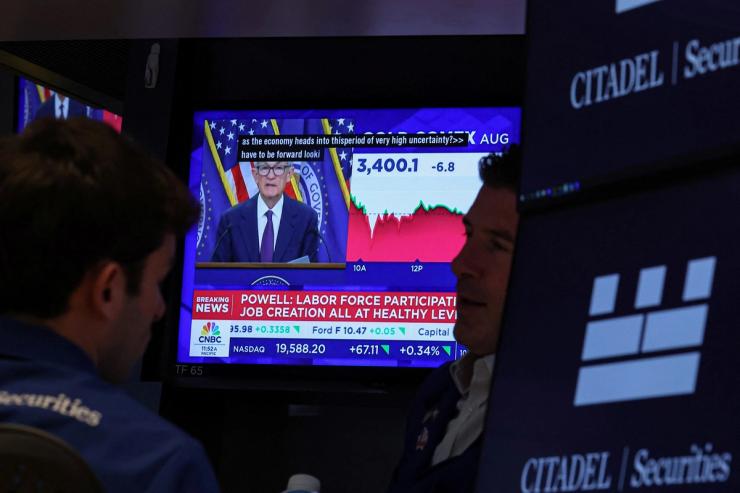The News
As President Donald Trump’s tariffs and his tax-and-spending bill change by the hour, his party is getting accustomed to a new reality: No one knows what’s going on with the economy.
Record-high uncertainty stemming from his administration’s on-again-off-again trade talks and unpredictable tariff strategy has deterred the Federal Reserve from cutting interest rates and made it harder for businesses to plan around imports and borrowing costs. Those same businesses have had to simultaneously struggle with negotiations over Republicans’ megabill that are full of optimism — but short on clarity.
The Business Roundtable said Wednesday that both trade and tax murkiness caused CEOs’ economic outlook to decline again in the second quarter. Weakening retail sales and drooping housing starts are also indicators of possible trouble ahead.
Yet other US economic data has remained strong, with a labor market that appears resilient, inflation that’s tempered, and consumer sentiment that seems on the rise.
Trump’s advisers tout that economic data as proof that their critics are wrong. They say import prices — which the Bureau of Labor Statistics said Tuesday did not change in May — would have increased if Trump’s tariffs were as destructive as Democrats predicted.
“It was like the world was ending. I mean, it was sincere insanity,” Joe LaVorgna, counselor to Treasury Secretary Scott Bessent, told Semafor of the opposing party’s warnings as Trump imposed his levies.
But LaVorgna, the former chief economist of Trump’s National Economic Council, also acknowledged that the administration’s trade strategy still could create risks: “Look, maybe at some point there’ll be something, somewhere. Even a broken clock is right twice a day. But the fact is this — that the numbers continue to surprise to the downside.”
The Jell-O quality of the US economy this year may simply be due to the famously unpredictable president. Hours after Bessent told lawmakers last week that an extended pause on country-specific tariffs could happen for countries “negotiating in good faith,” Trump said he’d consider reimposing unilateral tariffs next month.
Federal Reserve Chair Jerome Powell said this week that the central bank is “beginning to see some effects” of the tariffs, and it does “expect to see more of them over the coming months.”
Regardless of what’s keeping indicators in purgatory, business-friendly Republicans have two ways of dealing with it: eliminating the uncertainty that’s within their control — which means passing a tax bill — and getting accustomed to the rest.
“The real test of whether we’re in a non-inflationary posture with respect to trade uncertainty will occur in the second half of this year,” Sen. Thom Tillis, R-N.C., told Semafor.
He added that he recently asked a business weighing whether to invest in North Carolina what it wants to see “before you make the ultimate decision.” Their answer, he recalled: “‘The tax bill and trade.’”
He’s pushing for changes to the megabill that would give businesses more time to adapt — namely, a longer phaseout of clean-energy tax credits. And he’s joining Sen. Chuck Grassley, R-Iowa, in urging the White House to announce more trade deals as soon as possible.
“That would be great to settle down the uncertainty,” Tillis said.
Sen. John Boozman, R-Ark., also invoked the U-word: “That’s the biggest enemy of businesses, is having uncertainty … The sooner they know what the tax policy is going to be, [the better].”
LaVorgna, too, underscored the importance of passing the tax legislation: “The numbers right now have been spectacularly good, and I’m hopeful they’ll continue, but you need the bill.”
In this article:
Know More
In the latest sign of limbo, Powell said Wednesday that the central bank would again leave interest rates untouched as it waits for more insight into what happens next. He predicted that “increases in tariffs this year are likely to push up prices and weigh on economic activity” — at least temporarily.
Trump’s fury at the central bank may not help. The president on Wednesday called the Fed chair a “stupid person” for not cutting interest rates and mused whether he should appoint himself in his stead.
Businesses that stand to benefit from Republicans’ tax-and-spending bill are seizing on the overall murkiness to force fast passage.
“CEOs are approaching the next six months with caution,” Business Roundtable Chair Chuck Robbins said. “The results underscore the urgent need for Congress to pass pro-growth tax legislation that preserves our globally competitive tax system.”
Not every GOP lawmaker is listening closely to businesses’ pleas.
“We’re not going to do anything hurried, for any reason, other than doing the right thing,” Sen. Tommy Tuberville, R-Ala., said. “We don’t rush it until we make sure we’ve got 51 votes.”
There’s also the question of what happens once Trump signs the bill.
Republicans say the legislation will spark enough growth to eventually close the gap between government spending and revenues. But the nonpartisan Congressional Budget Office this week pegged that growth at just 0.5 percent of GDP over a decade, which higher borrowing costs would eclipse to the tune of $2.8 trillion.
Fiscal hawk Sen. Ron Johnson, R-Wis., has said he’ll vote against the bill in its current form.
Eleanor’s view
The story of Trump’s effect on the economy can be summed up like this: Things look fine! But also, nothing’s really happened yet.
Hard data, like jobs and prices, look good. Softer measures of expectations, like consumer sentiment, look less good, but also not as bad as they could be.
Until the president wraps (or declares a wrap to) trade talks and signs the megabill, we won’t get the full picture of his agenda’s economic effects. But it’s notable the degree to which his team is pushing back on the doomsaying that followed “Liberation Day” and its subsequent stock market swoon.
“I think what the economics profession needs to do is move a little bit away from the textbook version of how macroeconomics works, where everything is in fancy hieroglyphics and it’s all models-driven and ‘only us who are chosen can predict the world,’ and have a little bit more humility,” LaVorgna told me.
One thing’s for sure: By the time the verdict is in on Trump’s economy, it’ll be much harder for Republicans to push back. Arguing against uncertainty is easy for his party; arguing against him is not.
Room for Disagreement
Democrats point out many of Trump’s tariffs won’t take effect until July — and predict US consumers will see higher costs then.
“You want to take that bet for July prices? I’ll take that bet,” Sen. Mark Warner, D-Va., said of the static-for-now price picture. “Even if it ends up in the default position of 10 percent [tariffs], that’s still higher than the Smoot-Hawley tariffs were in the 1930s that brought up a depression.”
They’re sticking to what they see as effective messaging on the economy, despite its holding pattern.
“The risks [of tariffs] are very clear,” Sen. Chris Van Hollen, D-Md., said. As for the GOP’s megabill, “we know what kind of damage it will do.”
For Democrats, it’s only a matter of time until that damage is reflected in the data. And while the Fed may not be as certain of the outcome, it does appear to agree that more clarity is coming soon: Powell said this week that central bankers “feel like [they’re] going to learn a great deal more over the summer.”
Notable
- Council of Economic Advisers Chair Stephen Miran told POLITICO that “folks that do have precise forecasts are kind of silly.”
- Evercore ISI Vice Chair Krishna Guha told the Wall Street Journal that “the data to date can be viewed as glass half-full, or glass half-empty.”


